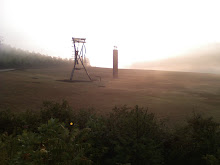As you move about on campus, you may be noticing some strategically placed reading-material. Here's the buzz, put together by our very own E.S.P.:
So, what’s all this talk about “Sustainability” about anyways?
It’s actually pretty simple. We live on one planet, with only so many materials and resources to go around. Simply put, at our current rates of very high consumption and exponential population growth, we are going to run out of supplies. We literally can’t “sustain” ourselves as a species. As our population grows exponentially, we’re eventually going to run out of gas, water, wood, metals, even certain foods. We’re simply burning out our planet.
Is running out of supplies inevitable? Nope! That’s where sustainability comes in. We each have the power, each and every day, to make either sustainable choices, or non-sustainable choices. Here are just a few things YOU can do, today, and forever, to make sustainable choices, for yourself, and for future generations who’ll inherit the planet we give to them:
1. Power down! Look for opportunities in your life to significantly reduce energy use: drive less, turn off lights and computers, buy local seasonal food (food takes enormous energy to grow, package, store and transport), wear a sweater instead of turning up heat, use clotheslines instead of a dryer, buy used or borrow things before buying new, recycle. All these things save energy and save you money.
2. Waste less. There are hundreds of opportunities each day to nurture a Zero Waste culture in your home, school, workplace, church, community. This takes developing new habits which soon become second nature. Use both sides of the paper, carry your own mugs and shopping bags, compost food scraps, avoid bottled water and other over packaged products, upgrade computers rather than buying new ones, repair and mend rather than replace….the list is endless!
3. Talk to everyone about these issues. At school, your neighbors, in line at the supermarket, on the bus…A student once asked Cesar Chavez how he organized. He said, “First, I talk to one person. Then I talk to another person.” “No,” said the student, “how do you organize?” Chavez answered, “First I talk to one person. Then I talk to another person.” You get the point. Talking about these issues raises awareness, builds community and can inspire others to action.
4. Make Your Voice Heard. Write letters to the editor and submit articles to local press. In the last two years, and especially with Al Gore winning the Nobel Peace Prize, the media has been forced to write about Climate Change. As individuals, we can influence the media to better represent other important issues as well. Don’t forget the RGNS blog! (sustainablergns.blogspot.com)
5. Change your lightbulbs…and then, change your paradigm. Changing lightbulbs is quick and easy. Energy efficient lightbulbs use 75% less energy and last 10 times longer than conventional ones. That’s a no-brainer. But changing lightbulbs is just tinkering at the margins of a fundamentally flawed system unless we also change our paradigm. A paradigm is a collection of assumptions, concepts, beliefs and values that together make up a community’s way of viewing reality. Our current paradigm dictates that more stuff is better, that infinite economic growth is desirable and possible, and that pollution is the price of progress. To really turn things around, we need to nurture a different paradigm based on the values of sustainability, justice, health, and community.
6. Buy Green, Buy Fair, Buy Local, Buy Used, and most importantly, Buy Less. Shopping is not the solution to the environmental problems we currently face because the real changes we need just aren’t for sale in even the greenest shop. But, when we do shop, we should ensure our dollars support businesses that protect the environment and worker rights. Look beyond vague claims on packages like “all natural” to find hard facts. Is it organic? Is it free of super-toxic PVC plastic? When you can, buy local products from local stores, which keeps more of our hard earned money in the community. Buying used items keeps them out of the trash and avoids the upstream waste created during extraction and production. But, buying less may be the best option of all. Less pollution. Less Waste. Less time working to pay for the stuff. Sometimes, less really is more.
(PRINTED ON REUSED PAPER & BROUGHT TO YOU BY THE E.S.P. Come to the next meeting if you want to get involved! Much of the info on this page is adapted from storyofstuff.com)
Friday, February 29, 2008
Thursday, February 21, 2008
Be Part of a Good Thing...
Hey Readers! Have something to share regarding sustainability or efforts to befriend the planet? Have your thoughts published on the blog!
Be sure to read the articles below and check back from time to time. There's more to come!
Send articles or blurbs to mcphillips@rabungap.org.
Subscribe to:
Posts (Atom)


